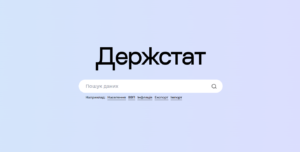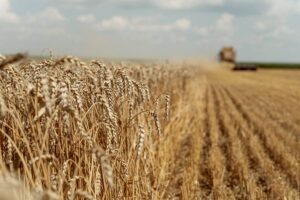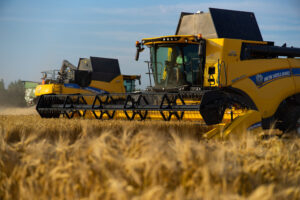
The State Statistics Service of Ukraine (SSS) is currently working on developing a new, more user-friendly website, which it plans to launch in autumn this year, according to SSS head Arsen Makarchuk.
“It is not only the product that is important, but also its packaging, presentation… We need to become closer and better in presenting our product. It (the website) should become a place where statistics answer questions, allow you to see the country through data, and not just be uploaded in Excel format,” he said in an interview with Interfax-Ukraine.
Makarchuk noted that, in accordance with legislation and established practice, the term “user” is used in official documents at the State Statistics Service, but for him it is essential to consider those for whom the statistical agency works not as users, but as customers.
“What is a client? Essentially, it is an economic agent who makes an informed choice in favor of using your products or refusing to use them if the product is not satisfactory. To satisfy our client, we need to provide them with what they need,” emphasized Makarchuk, who headed the State Statistics Service in early March, having previously worked at the National Bank for many years.
According to him, if the State Statistics Service cannot satisfy the customer’s need for data, the customer will satisfy it elsewhere, even if the data quality is worse, while the state statistics agency will be left “out in the cold.”
As an example, the new head cited the consumer price index assessment, which he would like to speed up because some clients may use web scraping, an automated process of collecting large amounts of data on the Internet, instead of official statistics.
Another example Makarchuk cited was the population estimate, which the State Statistics Service has not published since 2022 for objective reasons, and therefore many clients — from central executive authorities to international organizations — rely on their own estimates, such as the Institute of Demography, which estimates the population at 28 to 34 million.
“The World Bank and the International Monetary Fund conduct their own estimates. We do not know what methodologies they use. These are largely assumptions rather than accurate estimates, but in the absence of our product, they use others. The threat is that at some point we will have no customers left. If we don’t offer a good product that meets their requirements, they will find other sources,” Makarchuk concluded.

Astarta, Ukraine’s largest sugar producer, has completed its early grain and oilseed harvest, yielding 237,000 tons of wheat (-9% y/y) and 31,000 tons of rapeseed (-23% y/y), according to the press service of the agricultural holding.
Astarta noted that wheat yields were 5.2 tons/ha (-3% y/y) and rapeseed yields were 2.7 tons/ha (-20% y/y).
“The current season was characterized by a number of climatic challenges: a lack of precipitation over most of the territory, spring frosts, local hailstorms, and prolonged rains in the western regions, which affected the pace of crop ripening and harvesting. At the same time, thanks to effective planning, the prompt deployment of equipment, and the coordinated work of Astarta’s agronomic and production teams, the company ensured timely and high-quality harvesting,” the agricultural holding said.
The highest results were achieved by agricultural companies in western Ukraine: Zhitnytsia Podillya with a wheat yield of 7.4 t/ha and Volochysk-Agro with a rapeseed yield of 3.1 t/ha. Astarta has now begun harvesting late crops.
At the same time, Astarta’s farmers are sowing winter crops for the 2026 harvest. The planned areas are 44,000 ha for winter wheat (-3% y/y) and 16,000 ha for winter rapeseed (+45% y/y).
According to the results of the first half of 2025, revenue in the segment amounted to EUR61 million (-38% y/y) amid a decline in sales volumes compared to last year’s harvest. Exports accounted for 83% of the segment’s revenue (compared to 93% in the first half of 2024),” the agricultural holding summarized.
Astarta is a vertically integrated agro-industrial holding operating in eight regions of Ukraine and the largest sugar producer in Ukraine. It comprises six sugar factories, agricultural enterprises with a land bank of 220,000 hectares, dairy farms with 22,000 head of cattle, an oil extraction plant in Hlobyn (Poltava region), seven elevators, and a biogas complex.
In 2024, Astarta increased its net profit by 34.5% to EUR83.25 million, while its consolidated revenue decreased by 1.1% to EUR612.15 million.
In the first quarter of this year, the agricultural holding’s revenue fell by 24.9% to EUR124.58 million, while net profit fell by 28.8% to EUR6.42 million.
On June 12 this year, the shareholders’ meeting approved the payment of dividends for 2024 in the amount of EUR0.5 per share for a total of EUR12.5 million, which corresponds to the figures for the previous two years.

In January-June 2025, ARX Insurance Company (Kyiv) collected net premiums in the amount of UAH 2.575 billion, which is 35.17% more than in the same period a year ago, and increased gross premiums to UAH 2.731 billion (+39.7%).
These statistics are provided on the website of RA “Standard-Rating” regarding the update of the company’s credit rating/financial stability (reliability) rating at the level of “uaААА” on the national scale based on the results of the first half of 2025.
According to the published data, revenues from individuals increased in the insurer’s portfolio by 37.89% to UAH 1.579 billion, while revenues from reinsurers decreased by 33.56% to UAH 3.846 million. Thus, the share of individuals in the gross premiums of the insurance company was 57.83%, and the share of reinsurers was 0.14%.
Insurance payments sent to reinsurers in the first half of 2025 increased more than threefold compared to the same period in 2024, to UAH 155.850 million, The reinsurers’ share in insurance premiums increased to 5.71% in the first half of 2025.
The volume of insurance payments made by the insurer during this reporting period increased by 16.86% compared to January-June 2024, to UAH 1 billion. Given the higher growth rate of gross premiums compared to insurance payments, the level of payments decreased by 7.16 percentage points (pp) to 36.63%.
The RA notes that, based on the results of the first half of 2025, ARKS Insurance Company’s activities were profitable: the company received UAH 61.608 million in operating profit and UAH 198.688 million in net profit.
As of July 1, 2025, its assets increased by 12.71% to UAH 5.883 billion, equity showed an increase of 7.55% to UAH 2.832 billion, liabilities increased by 17.96% to UAH 3.051 billion, and cash and cash equivalents increased by 42.01% to UAH 1.161 billion.
According to RA data, as of the beginning of the third quarter of 2025, the company had a capitalization level of 92.81%, and 38.05% of its liabilities were covered by cash and cash equivalents.
At the same time, as of July 1, 2025, the insurer made financial investments in the amount of UAH 2.889 billion, consisting of government bonds and municipal bonds (63.27% of the investment portfolio), as well as deposits in banks with an investment-grade credit rating (36.73% of the portfolio). Thus, as of the reporting date, liquid assets exceeded the liabilities of ARKS Insurance Company by 1.33 times.
ARKS is part of the international insurance holding company Fairfax Financial Holdings Ltd.

The Vilia group of companies harvested 102.7 thousand tons of grain crops from an area of 20.19 thousand hectares in the 2025 season, the company’s press service reported on Facebook.
The company noted that in 2025, the largest area among winter crops was allocated to wheat – 8.14 thousand hectares and rapeseed – 9.46 thousand hectares.
The harvest by crop showed that 74.98 thousand tons of winter wheat were harvested from 8,139 hectares with an average yield of 9.21 tons/hectare, 6.51 thousand tons of hard winter wheat (durum) were harvested from 911 hectares with a yield of 7.15 tons/ha, 3.42 thousand tons of hard spring wheat were harvested from 422 hectares with a yield of 8.10 tons/ha, 9.93 thousand tons of winter rapeseed were harvested from 1,262 hectares with a yield of 7.86 tons/ha, 32.38 thousand tons of spring rapeseed were harvested from 9,465 hectares with a yield of 3.42 tons/ha.
“In some fields, the yield reached 5.40 tons/ha for rapeseed and 11.74 tons/ha for wheat, which indicates the high potential of our land and the professional work of our team,” the company summarized, adding that it has already started the sowing campaign for the 2026 harvest.
The Viliya Group of Companies unites a number of enterprises in the Volyn and Rivne regions that cultivate 52,000 hectares, specialize in the production of agricultural crops, storage of grain, oilseeds, and legumes, grain trading, flour and cereal production, and livestock farming.
Its parent company, Volyn-Zerno-Produkt LLC, began operations in 2001. The Vilia Group consists of seven elevators in the Volyn and Rivne regions, Lutsk Feed Mill LLC, Mlyniv Feed Mill LLC, a seed plant, a number of warehouses, and its own railway track. The beneficiary of the enterprise is Yevhen Dudka.

Almost half of divorces occur in five regions
In the first half of 2025, Ukrainians dissolved at least 38,700 marriages in courts — three times more than in civil registry offices (12,700). Almost half of divorces occur in five regions. The lowest divorce rate is in the west of the country.
Ukrainians dissolved at least 38,671 marriages in courts in the first half of 2025, according to the Babusya court decision search engine. The Dnipropetrovsk region became the absolute leader in the number of dissolved marriages in Ukraine this year. In six months, 5,188 couples divorced here, accounting for 13% of all court decisions found using the Babusya court registry search engine.
The capital ranks second: 3,544 divorce decisions (9%) were recorded in Kyiv. Third place goes to the Odesa region with 3,121 cases (8%).
In total, 45% of all divorces are concentrated in five regions: Dnipropetrovsk, Odesa, Kharkiv, Kyiv regions, and Kyiv itself.
In the west of the country, the divorce rate is traditionally low. In the Zakarpattia region, courts considered 777 cases, and in the Volyn region, 829. These are among the lowest rates in Ukraine, excluding regions affected by hostilities.
During the same period, 12,691 marriages were dissolved in civil registry offices, three times less than in courts. It is worth noting that the same regions are in the lead, with only minor changes: the capital ranks first with 1,780 divorces, followed by the Dnipropetrovsk region with 1,252, and the Kharkiv region closes the top three with 889.
Apart from the frontline and partially occupied regions, the lowest number of divorces in civil registry offices was again in Zakarpattia — 171 cases, followed by Chernivtsi (239) and Ternopil (247) regions.
It should be noted that divorce at a civil registry office is possible if the spouses have no joint property or disputes over its division, and no minor children.
https://opendatabot.ua/analytics/divorces-2025

The Vienna Insurance Group (VIG) reported a 10.5% increase in pre-tax profit to €531.4 million in the first half of 2025 compared to the same period in 2024, partly due to significantly lower overall claims development.
According to the Reinsurance News website, citing data from the insurer, gross written premiums also increased to €8.57 billion (up 8.7%).
According to VIG, all areas of its business recorded growth, with the highest rates observed in life insurance (+32.7%) and life insurance linked to investment funds and indices (+26.4%).
Meanwhile, health insurance grew by 15.0% and motor vehicle liability insurance by 12.5%.
VIG also added that premiums in special markets grew by 19%, with Turkey (23.8%), Poland (15.2%), and the wider Central and Eastern Europe region (10.1%) being the main growth drivers, with Romania (+14.4%) and the Baltic states (+10.7%) making the largest contributions to this figure.
At the same time, insurance premiums grew by 6.7% in the Czech Republic and 5.2% in Austria.
As reported, VIG’s net combined ratio for the first half of 2025 improved to 91.9% compared to 93.3% in the first half of 2024. This is due to significantly lower costs caused by weather conditions and natural disasters during the period.
In Ukraine, VIG is represented by PJSC “IC ”Knyazha Vienna Insurance Group“, PJSC ”IC “Ukrainian Insurance Group” and PJSC “IC ”Knyazha LIFE Vienna Insurance Group”.